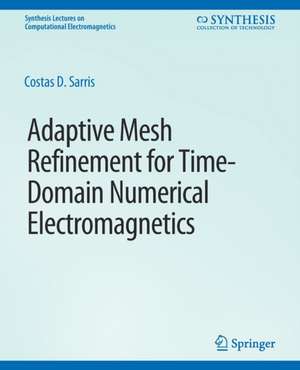Adaptive Mesh Refinement in Time-Domain Numerical Electromagnetics: Synthesis Lectures on Computational Electromagnetics
Autor Costas D. Sarrisen Limba Engleză Paperback – 31 dec 2007
Din seria Synthesis Lectures on Computational Electromagnetics
-
 Preț: 259.04 lei
Preț: 259.04 lei -
 Preț: 264.20 lei
Preț: 264.20 lei -
 Preț: 234.35 lei
Preț: 234.35 lei -
 Preț: 262.29 lei
Preț: 262.29 lei -
 Preț: 262.47 lei
Preț: 262.47 lei -
 Preț: 260.18 lei
Preț: 260.18 lei -
 Preț: 262.09 lei
Preț: 262.09 lei -
 Preț: 262.68 lei
Preț: 262.68 lei -
 Preț: 262.68 lei
Preț: 262.68 lei -
 Preț: 389.11 lei
Preț: 389.11 lei -
 Preț: 261.53 lei
Preț: 261.53 lei -
 Preț: 260.77 lei
Preț: 260.77 lei -
 Preț: 263.28 lei
Preț: 263.28 lei -
 Preț: 205.70 lei
Preț: 205.70 lei -
 Preț: 320.40 lei
Preț: 320.40 lei -
 Preț: 260.56 lei
Preț: 260.56 lei -
 Preț: 261.53 lei
Preț: 261.53 lei -
 Preț: 261.91 lei
Preț: 261.91 lei -
 Preț: 387.96 lei
Preț: 387.96 lei -
 Preț: 259.19 lei
Preț: 259.19 lei -
 Preț: 266.92 lei
Preț: 266.92 lei -
 Preț: 259.96 lei
Preț: 259.96 lei -
 Preț: 261.32 lei
Preț: 261.32 lei -
 Preț: 264.41 lei
Preț: 264.41 lei -
 Preț: 262.47 lei
Preț: 262.47 lei -
 Preț: 322.70 lei
Preț: 322.70 lei -
 Preț: 269.22 lei
Preț: 269.22 lei -
 Preț: 261.91 lei
Preț: 261.91 lei -
 Preț: 389.70 lei
Preț: 389.70 lei -
 Preț: 319.59 lei
Preț: 319.59 lei -
 Preț: 269.22 lei
Preț: 269.22 lei
Preț: 264.20 lei
Nou
Puncte Express: 396
Preț estimativ în valută:
50.56€ • 52.59$ • 41.74£
50.56€ • 52.59$ • 41.74£
Carte tipărită la comandă
Livrare economică 15-29 aprilie
Preluare comenzi: 021 569.72.76
Specificații
ISBN-13: 9783031005671
ISBN-10: 3031005678
Ilustrații: XVII, 135 p.
Dimensiuni: 191 x 235 mm
Greutate: 0.28 kg
Editura: Springer International Publishing
Colecția Springer
Seria Synthesis Lectures on Computational Electromagnetics
Locul publicării:Cham, Switzerland
ISBN-10: 3031005678
Ilustrații: XVII, 135 p.
Dimensiuni: 191 x 235 mm
Greutate: 0.28 kg
Editura: Springer International Publishing
Colecția Springer
Seria Synthesis Lectures on Computational Electromagnetics
Locul publicării:Cham, Switzerland
Cuprins
Introduction.- A Numerical Interface Between FDTD and Haar MRTD: Formulation and Applications.- Efficient Implementation of Adaptive Mesh Refinement in the Haar Wavelet-based MRTD Technique.- The Dynamically Adaptive Mesh Refinement (AMR)-FDTD Technique: Theory.- Dynamically Adaptive Mesh Refinement in FDTD: Microwave Circuit Applications.- Dynamically Adaptive Mesh Refinement in FDTD: Optical Applications and Error Estimates.
Notă biografică
Costas D. Sarris received a Ph.D. and a M.Sc. in Electrical Engineering, and a M.Sc. in Applied Mathematics from the University of Michigan, Ann Arbor, in 2002, 1998 and 2002, respectively. He also received a Diploma in Electrical and Computer Engineering (with distinction) from the National Technical University of Athens (NTUA), Greece, in 1997. In November 2002, he joined the Edward S. Rogers Sr. Department of Electrical and Computer Engineering (ECE), University of Toronto, Toronto, ON, Canada, where he is currently an Assistant Professor. His research interests are in the area of computational electromagnetics, with emphasis in high-order, mesh-adaptive techniques. He is currently involved with basic research in novel numerical techniques, as well as applications of time-domain analysis to wireless channel modeling, wave-propagation in complex media and meta-materials and electromagnetic compatibility/interference (EMI/EMC) problems. Prof. Sarris has received a number of scholarship distinctions, including Hellenic Fellowship Foundation (1993–1997) and Technical Chamber of Greece (1994–1997) awards for academic excellence and an NTUA 1997 class bronze medal. He received a student paper award in the 2001 International Microwave Symposium for his work on a hybrid FDTD/MRTD numerical scheme, a Canada Foundation for Innovation New Opportunities Fund Award in 2004 and an award for excellence in undergraduate teaching from the Department of Electrical and Computer Engineering, University of Toronto
